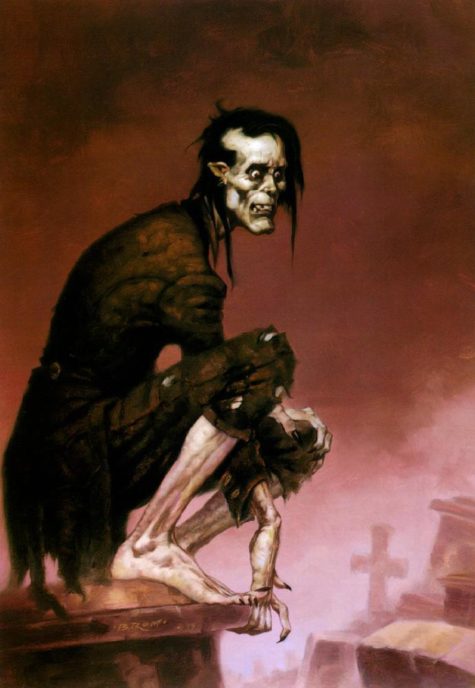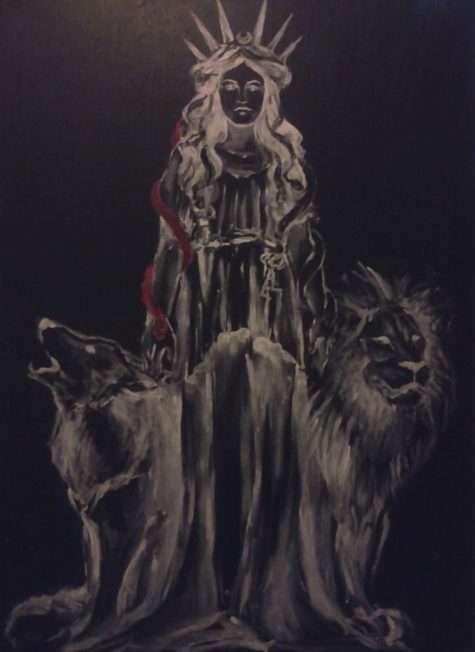Graveyard
A Ghoulish Story
The case of Sergeant Bertrand, which is the last authenticated case of this kind, occurred in 1847, when, on the 10th of July, an investigation was held before a military council presided over by Colonel Manselon.
For some months the cemeteries in and around Paris had been the scenes of frightful violations, the culprits (or culprit), in some extraordinary manner, eluding every attempt made to ensnare them. At one time the custodians of the cemeteries were suspected, then the local police, and for a brief space suspicion fell even on the relations of the dead.
The first burial-place to be so mysteriously visited was the Cemetery of Pere Lachaise. Here, at night, those in charge declared they saw a strange form, partly human and partly animal, glide about from tomb to tomb. Try how they would they could not catch it – it always vanished – vanished just like a phantom directly they came up to it; and the dogs when urged to seize it would only bark and howl, and show indications of the most abject terror.
Always when morning broke the ravages of this unsavoury visitant were only too plainly visible – graves had been dug up, coffins burst open, and the contents nibbled, and gnawed, and scattered all over the ground. Expert medical opinion was sought, but with no fresh result. The doctors, too, were agreed that the mutilations of the dead were produced by the bites of what certainly seemed to be human teeth.
The sensation caused by this announcement was without parallel; and one and all, old and young, rich and poor, were wanting to know whatever sort of being it could be that possessed so foul an appetite. The watch was doubled; all to no purpose. A young soldier was arrested, but on declaring he had merely entered the cemetery to meet a friend, and exhibiting no evidences of guilt, was let go.
At length the violation ceased in Pere Lachaise and broke out elsewhere. A little girl, greatly beloved by her relatives and friends, died, and a big concourse of people attended the funeral. On the following morning, to the intense indignation of every one, the grave was discovered dug up, the coffin forced open, and the body half eaten.
In its wild fury at such an unheard-of atrocity the public called loudly for the culprit. The father of the dead girl was first of all arrested, but his innocence being quickly established, he was set free. Every means was then taken to guard against any recurrence, but in spite of all precautions the same thing happened again shortly afterwards; and happened repeatedly.
The fact that the cemetery was surrounded by very high walls, and that iron gates, which were always kept shut, formed the only legitimate entrance, added to the mystery, and made it seem impossible that any creature of solid flesh and blood could be responsible for the outrages.
Having observed that at one place, in particular, the wall, though nearly ten feet high, showed signs of having been frequently scaled, an old army officer set a trap there, consisting of a wire connected with an explosive, which was so arranged that no one could climb over the wall without treading on the wire and causing an explosion.
A strong posse of detectives kept watch, and at midnight a loud report was heard. The detectives were not, however, as quick as their quarry. They saw a man, or what they took to be a man, and fired at him, but he was gone like a flash of lightning, scaling the wall with the agility of a monkey. Finding a trail of blood, however, and pieces of torn uniform accompanying the bloodstains, they concluded that the enemy was wounded, and that the marauder was, moreover, a soldier.
Still, it is doubtful whether his identity would have been proved, had not one of the grave-diggers of the cemetery chanced to overhear some sappers of the 74th Regiment remark that on the preceding night one of their comrades – a sergeant – had been conveyed to the military hospital of Val de Grace badly wounded. The matter was at once inquired into, and the wounded soldier, Sergeant Bertrand, was found to be the author of the long series of hideous violations.
Bertrand freely confessed his guilt, declaring that he was driven to it against his own will by some external force he could not define, and which allowed him no peace. He had, he said, in one night exhumed and bitten as many as fifteen bodies. He employed no implements, but tore up the soil after the manner of a wild beast, paying no heed to the bruising and laceration of his hands so long as he could get at the dead.
He could not describe what his sensations were like when he was thus occupied; he only knew that he was not himself but some ravenous, ferocious animal. He added, that after these nocturnal expeditions he invariably fell into a profound sleep, often before he could get home, and that always, during that sleep, he was conscious of undergoing peculiar metamorphosis.
When interrogated, he informed the court of inquiry that, as a child, he preferred the company of all kinds of animals to that of his fellow creatures, and that in order to get in close touch with his four-footed friends he used to frequent the most solitary and out-of-the-way places – moors, woods, and deserts.
He said that it was immediately after one of these excursions that he first experienced the sensation of undergoing some great change in his sleep, and that the following evening, when passing close to a cemetery where the grave-diggers were covering a body that had just been interred, yielding to a sudden impulse, he crept in and watched them.
A sharp shower of rain interrupting their labours, they went away, leaving their task unfinished. “At the sight of the coffin,” Bertrand said, “horrible desires seized me; my head throbbed, my heart palpitated, and had it not been for the timely arrival of friends I should have then and there yielded to my inclinations. From that time forth I was never free – these terrible cravings invariably came on directly after sunset.”
Medical men who examined Bertram unanimously gave it as their opinion that he was sane, and could only account for his extraordinary nocturnal actions by the supposition that he must be the victim of some strange monomania. His companions, with whom he was most popular, all testified to his amiability and lovable disposition.
In the end he was sentenced to a year’s imprisonment, and after his release was never again heard of.
Ode to Hekate
James Cheney: Invocation To The Dark Mother
Daniel: Prayer Before The Final Battle
blessed obyno: Queen of Ghosts
blessed obyno: Queen of Ghosts
Caerlion Arthur: The Great, Bloody and Bruised Veil of the World





